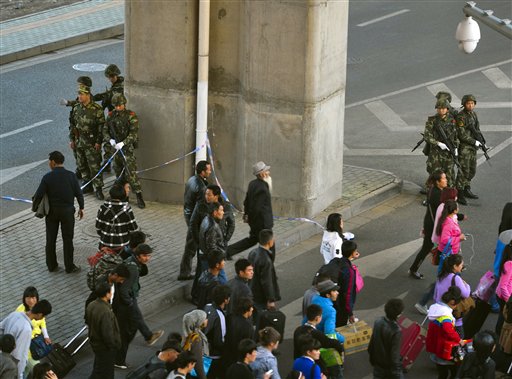CCTV: 3 dead in train station attack in China
Wednesday, April 30, 2014
BEIJING - An explosion rocked a railway station in China's far-western minority region of Xinjiang, and the state broadcaster said three people were killed and 79 people were injured. The attack Wednesday came as President Xi Jinping wrapped up a four-day visit to the area.
CCTV said assailants attacked crowds with knives and set off explosions at the same time at the Urumqi South Station. The television station called it a terrorist act.
It was unclear whether Xi was still in the region at the time of the blast, which occurred at the rail station in the regional capital of Urumqi.
Train service was suspended for about two hours before it reopened under the watch of armed police, the official Xinhua News Agency said.
A woman working at a convenience store near the train station said she heard a loud explosion shortly after 7 p.m.
"The whole area now has been cordoned off by police and military police," said the woman, who spoke by telephone and refused to give her name because of the sensitivity of the matter.
Photos circulating briefly on Chinese social media sites showed scattered luggage near the station's exit and a heavy presence of armed men. Xinhua said the blast was centered on some luggage left on the ground between the station's exit and a bus stop.
Ethnic tensions have been simmering for years in Xinjiang, the home of the Muslim Uighur minority group. In 2009, a series of riots broke out in Urumqi, leaving nearly 200 people dead. Despite a heavy crackdown, violence has continued in the region and began spreading elsewhere in the country last year.
Rian Thum, a professor at Loyola University in New Orleans, who specializes in Uighur history and issues, said the use of explosives and the location of Wednesday's blast were significant.
If it was a bomb attack targeting civilians, it "would mark an alarming deviation from previous patterns of Uighur political violence," Thum said.
"Most violent resistance had previously been directed at police officers, soldiers, and officials, often using knives and farm tools. The attack at the Urumchi train station, if it was carried out by Uyghurs, suggests an emerging pattern of more civilian targets and violence on a larger scale," he said.
Last year, three Uighurs rammed a vehicle into crowds in a suicide attack near the Forbidden City gate in the heart of Beijing, killing themselves and two tourists.
In March, five knife-wielding men and women believed to be Uighurs slashed at crowds indiscriminately at a railway station in southwestern China, killing 29 people. The government has blamed the attack on secession-seeking terrorists.
While Beijing faults separatists for raising ethnic tensions, government critics say restrictive and discriminatory policies and practices have alienated the Uighurs. They say Han people have flooded Xinjiang and benefited from its economic growth while Uighurs have felt excluded.
During his visit to the region, Xi urged government officials to maintain social stability, promote growth, improve living standards and strengthen ethnic unity, according to state media reports.
Xi's visit dominated state broadcaster CCTV's evening news program Wednesday. It showed him shaking hands with police in helmets and bulletproof vests and inspecting shields and weapons used to quell riots.
"Local police stations are the fists and the daggers. We must work hard at the grass-roots level of the police stations," Xi said. "We must take care of our front-line offices. You need to protect yourselves and make achievements at tasks such as better serving the people in the future and safeguarding social stability."
Thum said Xi's description of local police as fists and daggers also fit "many Uyghurs' views of the police."
Xi told officials that the long-term stability of Xinjiang is vital to the whole country's reform, development and stability, Xinhua reported.
Xi said China would deploy a "strike-first strategy" in its fight against terrorism, Xinhua said.

